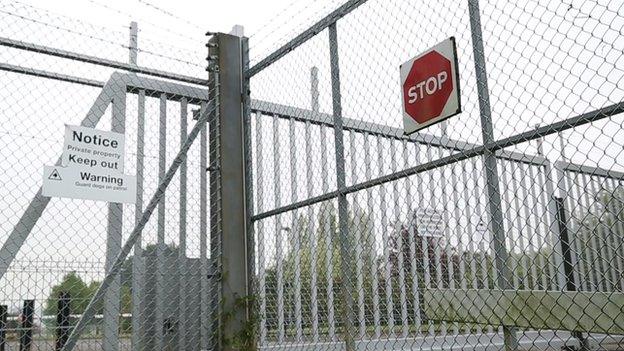Fast-track asylum appeal system suspended by government
- Published

Yarl's Wood in Bedfordshire is one of the UK's immigration detention centres
A system for detaining asylum seekers while their claims are speedily assessed has been temporarily suspended after it was ruled unlawful last month.
The Home Office decided to halt the Detained Fast Track (DFT) system amid concerns over safeguards, particularly for "vulnerable applicants".
Immigration minister James Brokenshire said he hoped the DFT system would resume within weeks.
It is thought about 800 applicants are affected - and can now seek bail.
Of those, it is estimated that about 100 may have to be released.
The system, introduced in 2000, accelerates legal hearings and appeals while keeping the individual detained. It is used in cases which officials believe can be decided quickly.
Last month the Court of Appeal ordered the Home Office to halt the system immediately after an earlier High Court hearing concluded it contained "structural unfairness".
High Court judge Mr Justice Nicol put a "legal stay" - a temporary delay - on his ruling on 12 June, following a case brought by campaign group Detention Action.
This meant the fast-track system remained in operation until the government had exhausted all opportunities to appeal.
'Legal challenge'
BBC home affairs correspondent Danny Shaw said officials were worried their procedures were not as robust as they should be.
In a statement to the House of Commons, Mr Brokenshire said the system had "come under significant legal challenge".
"Risks surrounding the safeguards within the system for particularly vulnerable applicants have also been identified to the extent that we cannot be certain of the level of risk of unfairness to certain vulnerable applicants who may enter DFT.
"In light of these issues, I have decided to temporarily suspend the operation of the detained fast-track policy.
"I hope this pause to be short in duration, perhaps only a matter of weeks, but I will only resume operation of this policy when I am sure the right structures are in place to minimise any risk of unfairness."
The decision to suspend the process means those asylum seekers detained and awaiting hearings will be reassessed at a "senior level" to see if they can be released from detention to continue their asylum application in the normal way.
Mr Brokenshire added: "Those who meet the general criteria for detention will not be directly affected by the decision to suspend DFT.
"Many are already detained under these powers, for example because they are at risk of absconding and face imminent removal.
"Only if detention can no longer be justified outside a DFT process will applicants be released to continue their asylum claim in the regular asylum system."
He said applicants who face removal to a safe third country, pose a risk to the public or are foreign offenders are "still liable to be detained or remain detained".
The DFT system accelerated some 4,300 asylum applications or decisions in 2013. It currently processes 30 to 40 cases a week.
Related topics
- Published26 June 2015

- Published12 June 2015
